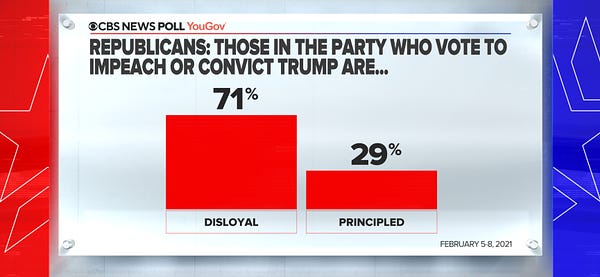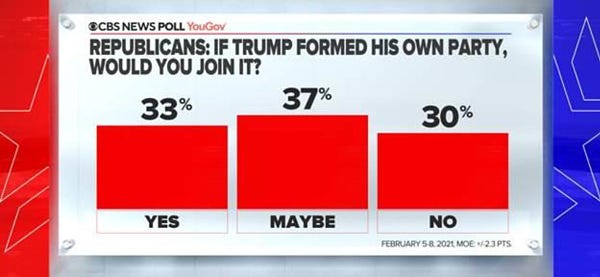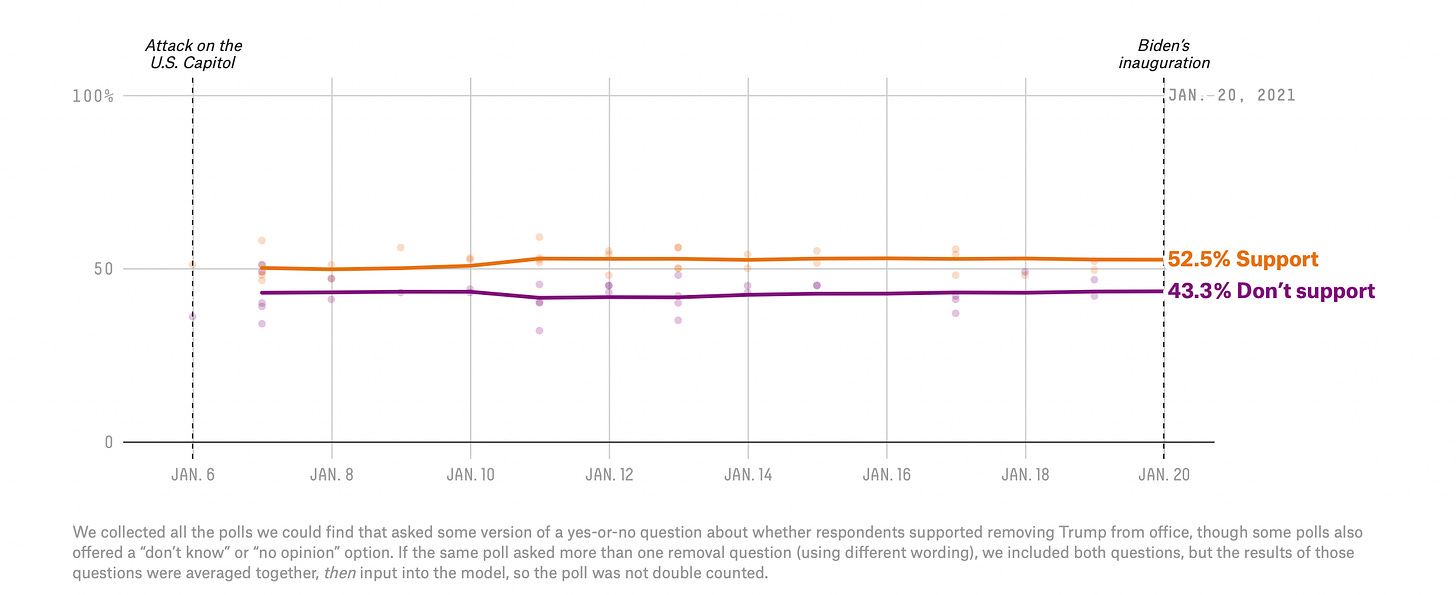Support for convicting Trump is higher now than during his first impeachment
The Senate is likely to acquit him anyway
The Senate today begins its second impeachment trial for former president Donald Trump, this time accused by the House of Representatives of inciting an insurrection against the government.
In a representative democracy like ours, it is fitting to ask: what do the people want their legislators to do? Convict, or acquit?
The latest polling data from Gallup shows that 52% of Americans want the Senate to convict the president. 45% are opposed. This is a big increase over the last trial; the seven-point margin in favor of conviction now contrasts with a five-point margin against during Trump’s first trial, as shown below:
It is worth noting that these numbers differ from other polling. FiveThirtyEight’s average of impeachment polls in 2020 showed that, by 50% to 45%, a clear plurality of voters wanted Trump convicted of the charges:
FiveThirtyEight’s second impeachment polling average also supports Gallup’s finding that support for conviction is higher this time — a margin of ten points, 53 to 43 percent:
And, for what it’s worth, significantly more people in 2020 thought Trump was guilty of committing a crime — specifically, withholding military aid to Ukraine in exchange for their president launching an investigation into the Bidens — than thought his behavior was proper. By a 20-point margin, 51% to 31%, the people thought he was guilty. Many just didn’t think it warranted the punishment.
(NB: Looking back on this, I was surprised that this margin was so high. I did not remember the public verdict to be so resoundingly in the negative. I guess that makes it all the more)

There are at least two explanations for the increase in support for Trump’s conviction this time, other than the difference in the seriousness of the allegations against him.
Editor’s Note: This blog only grows if you like and share posts. If you found this post informative, do me a huge favor and click the like button at the top of the page and the share button below. As a reminder: I’m cool with you forwarding these emails to a friend as long as you also ask them to subscribe!
First, take the highly-public nature of the attack on the Capitol last month. It was practically live-streamed on every cable news channel for 12 hours straight, with tens of millions more people tuning in online. The thing about self-coups in the digital age is that everyone is around to watch them unfold, glued to the screen wondering how this next episode of political content is going to play out.
Contrast this to Trump’s behind-the-scenes, secretive actions in the Ukraine scandal. Then, Americans only learned of whatever the news media and Congressional oversight uncovered — usually bent through the partisan lenses both of the cable channels they watch and the Congresspeople doing the questioning. The superabundance of video recordings of a Trump-flag-waving, MAGA-hat-wearing mob of people marching on the Capitol after Trump told them to likely increases the public’s awareness of his role in the crime.
Second, we ought to consider the role that Republican leaders might be playing in marginally increasing support for conviction among their voters. As I wrote last week, the struggle between some Trump-opposing GOP officials and the vast majority of his GOP supporters has presented an interesting natural experiment in the durability of opinion leadership, especially after a politician leaves office. The Trumpist v traditional elite Republican divide will undoubtedly have downstream consequences among voters. About thirty percent of GOP voters are more Republican than Trump supporter, according to recent CBS polling.





This would naturally lead us to expect that support for convicting Trump could be higher among the more-Republican-than-Trumpist group of voters if the leaders they defer to also support impeachment. Given the remarks from Mitch McConnell, Mitt Romney, Liz Cheney and others about the former president’s guilt, the increased support makes sense.
…
In the court of public opinion, Donald Trump has been thrice charged of committing an impeachable offense — one count each of abuse of power and obstruction of justice the first time around, and another count of inciting an insurrection this latest time. The House of Representatives, with its members being closely apportioned to the will of the people, has rendered the same verdict. Nevertheless, the malapportioned and Republican-advantaged Senate will probably let him get off scot-free again, acquitted on all three charges across both trials.






